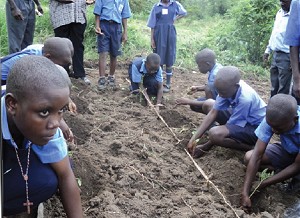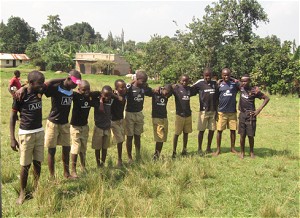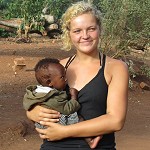 The aim of this project is to enable the children in the UK to learn about a developing country and to use Uganda to explore these issues, to enable them to appreciate the similarities and differences of living in a different country and culture and to develop a sense of global responsibility and respect for other people and the environment.
The aim of this project is to enable the children in the UK to learn about a developing country and to use Uganda to explore these issues, to enable them to appreciate the similarities and differences of living in a different country and culture and to develop a sense of global responsibility and respect for other people and the environment.
Environment / Culture - Life Chances / Expectations
All children are born into a certain culture that perceives children and childhood in a very different way. Childhood should be a period of freedom, self discovery and opportunity. However, for many children born into the developing world there are many obstacles for the child to overcome before adulthood is reached. Some of these obstacles are poverty, disease and a basic lack of infrastructure. There are however, also many advantages for the child in Uganda as the structure of the family, including the extended family provides a supportive, protective environment for a child. Family bonds are strong and the idea of caring and sharing are firmly rooted in tradition and culture. Each child belongs to a certain tribe and is valued within that tribe. The Ugandan child is given more responsibility at an earlier age and expected to help with the family chores compared to the UK child.
The average Ugandan home will have no electricity. Therefore television, computers, and electronic games are not the norm for Ugandan children. This could be seen as positive as the children are unspoiled by advertising and untainted by commercialism. An alternative perspective would argue that the children are not being given the benefits of new technologies and therefore are not given the breath of learning available worldwide.
Information from Our Ugandan Friends
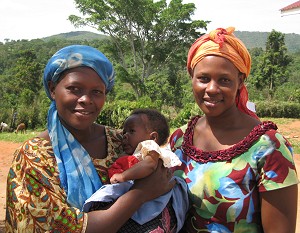 What is it like to be a child in Uganda?
What is it like to be a child in Uganda?
A child in Uganda is ever happy, at their homes they work hard, but often there are many children of the same age at a home so they enjoy working together in a team.
What toys do the children play with?
In Uganda there are few manufactured toys available for the children to play with and a childrens playground is a rarity. The majority of parents could not afford to buy toys and therefore the chidren have to use their imagination and creativity. The toys that are available are fashioned from local natural resouces - reeds, wood, fabric and discarded items.
The children make toys with the spare resources they have around them; for example they get a bottle cap (from a glass soda) put a hole in the middle, place it in the centre of a string and then twist it and watch it spin. You see these all over Uganda. They also play a game where they chase after a tyre, keep it rolling with a stick, you frequently see this. They also make balls out of tying plastic bags together in a ball and then play a game where they have to dodge the ball, this is usually played by girls. This is once again a brilliant example of how they use the little resources available to have a good time.
Example of a toy to push around
How are Ugandan children seen by their parents?
Parents work hard to raise their children in a good environment and provide them with the skills and ability to earn a good income in the future. This means that parents work exceptionally hard to put their children into good schools, as they want their family to be able provide for themselves and each other in the future.
What is expected of the child?
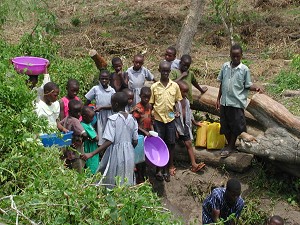 From as young as 5 a child is able to wash themselves, dress themselves, wash the clothes that they wear, prepare vegetables and do many other activities surrounding the daily work done by farmers in the villages. The children look after each other and work together in a harmonious way straight form when they get home from school. A 5 year old child is expected to take care of their 1 year old sister. Children in Uganda have long days and they certainly do not have lie-ins, nobody in Uganda lies in, if people do they must be very ill! The routine of a child above the age of 4/5, begins at around 5:30 am when they rise and finishes at around 10pm. Children work very hard, rarely quarrel and show immense respect to their elders. They are also expected to attend church and kneel when greeting adults or receiving anything from adults.
From as young as 5 a child is able to wash themselves, dress themselves, wash the clothes that they wear, prepare vegetables and do many other activities surrounding the daily work done by farmers in the villages. The children look after each other and work together in a harmonious way straight form when they get home from school. A 5 year old child is expected to take care of their 1 year old sister. Children in Uganda have long days and they certainly do not have lie-ins, nobody in Uganda lies in, if people do they must be very ill! The routine of a child above the age of 4/5, begins at around 5:30 am when they rise and finishes at around 10pm. Children work very hard, rarely quarrel and show immense respect to their elders. They are also expected to attend church and kneel when greeting adults or receiving anything from adults.
What are the child's aspirations?
From the age of a Primary child, children have very high aspirations; they work hard so that they can be doctors, engineers and even the president. They show a keen interest in any extra curriculum activities and take their educations seriously as their family are working hard to provide it.
Do the children have opportunities?
In terms of opportunities for children, there are not many unless you are very intelligent or rich. If you work hard there are opportunities for scholarships and bursaries. The government also provides opportunities for those wanting to study at university, through entrance tests for bursaries. Some schools, such as St Zoe's provides encouragement through bursaries to those each term who can achieve a overall grade percentage of 70% at the end of term.
A story of caring and sharing - from our teacher in Uganda
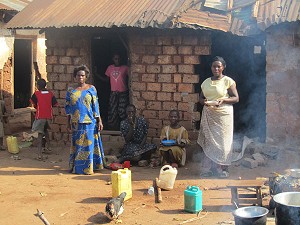 Kanyange is aged 5 and lives at a house called Tisola along with his father, John who is a (cattle keeper), Nangera (pig keeper), Mama Mully (helps to cook) Ssenyonjo (maths teacher and friend of the family) and the children; kukunda, Zoe, Nambowa, Namaganda, Kamoga and Karol. All of these children are between the age of 5 and 8 and go to St Zoe School. The youngest in the family is Karol who is 1 and a half years old. Every morning Karol awakes at 5:30am and has breakfast with his brothers and sisters before they walks to school. When the children return home from school Karol goes with the children to collect firewood or pick coffee beans. During the evening all the children help prepare food, peeling potatoes and cutting cabbage and then they wash their clothes and wash themselves from the water collected from the nearby pond. The children also have playtime and they like to dress up with their Mama's spare pieces of material from her sewing. Just before it goes dark the children help to get the cattle into their pens. The children go to sleep when the sun does down because there is no artificial light, all their activities are done before nightfall.
Kanyange is aged 5 and lives at a house called Tisola along with his father, John who is a (cattle keeper), Nangera (pig keeper), Mama Mully (helps to cook) Ssenyonjo (maths teacher and friend of the family) and the children; kukunda, Zoe, Nambowa, Namaganda, Kamoga and Karol. All of these children are between the age of 5 and 8 and go to St Zoe School. The youngest in the family is Karol who is 1 and a half years old. Every morning Karol awakes at 5:30am and has breakfast with his brothers and sisters before they walks to school. When the children return home from school Karol goes with the children to collect firewood or pick coffee beans. During the evening all the children help prepare food, peeling potatoes and cutting cabbage and then they wash their clothes and wash themselves from the water collected from the nearby pond. The children also have playtime and they like to dress up with their Mama's spare pieces of material from her sewing. Just before it goes dark the children help to get the cattle into their pens. The children go to sleep when the sun does down because there is no artificial light, all their activities are done before nightfall.
In Uganda young children/people are sometimes put into the position of having to bring up their brothers and sisters if their parents die. The custom is for the relatives of the family to take on the responsibility for the children and to pay for their eduction. However, some children/young people are the only person available to help and support the younger siblings.
An ethical dilemma
When we reflect about ethical dilemmas related to caring and sharing, a common scenario that comes to mind is the phenomenon commonly referred to in Uganda as 'child headed families'. Due to illness and death from disease and the two decades of war in the northern part of the country, many children lost their parents and were orphaned at an early age (5-14 years). The eldest child in the family then has to take on the role of the parents in the home such as providing for food, shelter, and health care. The child (the one heading the family) has to choose whether to abdicate this role of caring for the siblings and sharing what ever he/she earns from his/her efforts to survive or simply disappear and abandon the siblings. (This has implications for the education of the older child as he or she may have be leave school to care for younger brothers and sisters).
Caring for our animals
At St. Zoe's School the children learn Animal Husbandry and how to take care of the animals, feeding the sheep, pigs, goats, cows and chickens. All the food produced is used at the school and the milk provided from the cows and goats is boiled and used for the children's porridge.
Caring for our environment
The children at St. Zoe's and the Good Shepherd are very aware of their environment and the need to take care of all the resources available in a careful way. The children learn to plant seeds and watch the crops grow. A child in Uganda is surrounded by vegetation and can see bananas and exotic fruit growing on the trees and in the fields. The child has a diet full of fruit and vegetables but lacking in protein.
